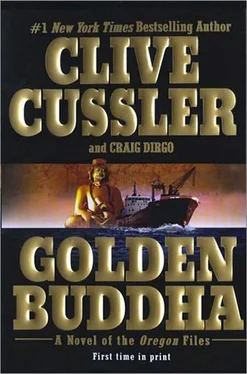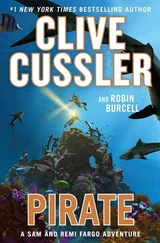Clive Cussler - Golden Buddha
Здесь есть возможность читать онлайн «Clive Cussler - Golden Buddha» весь текст электронной книги совершенно бесплатно (целиком полную версию без сокращений). В некоторых случаях можно слушать аудио, скачать через торрент в формате fb2 и присутствует краткое содержание. Жанр: Морские приключения, на английском языке. Описание произведения, (предисловие) а так же отзывы посетителей доступны на портале библиотеки ЛибКат.
- Название:Golden Buddha
- Автор:
- Жанр:
- Год:неизвестен
- ISBN:нет данных
- Рейтинг книги:3 / 5. Голосов: 1
-
Избранное:Добавить в избранное
- Отзывы:
-
Ваша оценка:
- 60
- 1
- 2
- 3
- 4
- 5
Golden Buddha: краткое содержание, описание и аннотация
Предлагаем к чтению аннотацию, описание, краткое содержание или предисловие (зависит от того, что написал сам автор книги «Golden Buddha»). Если вы не нашли необходимую информацию о книге — напишите в комментариях, мы постараемся отыскать её.
Golden Buddha — читать онлайн бесплатно полную книгу (весь текст) целиком
Ниже представлен текст книги, разбитый по страницам. Система сохранения места последней прочитанной страницы, позволяет с удобством читать онлайн бесплатно книгу «Golden Buddha», без необходимости каждый раз заново искать на чём Вы остановились. Поставьте закладку, и сможете в любой момент перейти на страницу, на которой закончили чтение.
Интервал:
Закладка:
The Dalai Lama scanned the grounds, then closed his eyes and visualized returning. He was dressed in trousers instead of robes, a black wool coat instead of a cloak. A rifle on a sling rode on his left shoulder, and an ancient ceremonial thangka, an embroidered silk tapestry, was rolled up and hung over his right.
“I am ready,” he said to his Chikyah Kenpo, or chief of staff. “Have you packed the icon?”
“It is safely crated and guarded. Like you, the men will protect it at all costs.”
“As they should,” the Dalai Lama said softly.
The two men walked toward and through the gate on the yellow wall.
The Chikyah Kenpo was holding a large, jeweled, curved sword. Sliding it into a leather scabbard on his belt, he turned to his master. “Stay close.”
Then, followed by a cadre of Kusun Depon, they passed through the outer gate and slipped into the crowd. The procession quickly made its way along a worn dirt path. Pairs of Kusun Depon stepped to the rear and waited to see if anyone followed. After seeing no one, they moved forward to the next pair of guards, who remained until the coast was clear. Hopscotching their way along the path, the guards made sure the rear was covered. To the front, pairs of warriors assessed any danger ahead. Finding it clear, they continued their progression. A handcart containing the icon followed the procession, pulled by a large monk. Hands firmly on the poles, the monk raced along like a rickshaw driver late for an appointment.
Everyone was trotting and the sound made by their feet was like muffled clapping.
The sound of water came with the smell of wet moss. It was a tributary of the Kyichu River. After the party made their way across a series of stepping-stones, they continued quickly ahead.
ALONG the far bank of the Kyichu River, Overholt stared at the radium dial on his watch, then shuffled his feet. Several dozen Kusun Depon who had been dispatched hours earlier were tending to the horses and mules that would speed the escape. They stared at the blond-haired American with neither malice nor fear, only resignation.
Several large ferryboats had brought them all across the water, and now the boats were tied up again on the far shore, awaiting the arrival of the Dalai Lama. Overholt caught a quick flash of light from the far bank, signaling it was safe to cross. In the moonlight, he could see the boats quickly being loaded, then minutes later heard the sound of the oars slapping the water.
The lead boat slid onto the pebbled beach and the Dalai Lama climbed over the side.
“Langston,” he said, “did you leave the capital undetected?”
“Yes, Your Holiness.”
“All your men with you?”
Overholt pointed to the seven men that made up his command. They stood off to the side with several footlockers of equipment. Reaching the opposite shore, the Chikyah Kenpo climbed from the boat and assembled the lead troops onto horses. Long spears draped with silk banners were placed in the troops’ hands. Earlier, their steeds had been covered with ceremonial blankets and adornments. Then, like the honk of a goose on his way south, a sound of a muted trumpet filled the air. It was time to leave.
Overholt and his men were helped onto horses and lined up following the Dalai Lama. By the time the sun rose the next morning, they were miles from Lhasa.
TWO days into the journey, across the sixteen-thousand-foot Che-La Pass and over the Tsangpo River, the group stopped for the night at the monastery at Ra-Me. Messengers racing on horseback caught up with the party and brought news that the Chinese had shelled Norbulingka and machine-gunned the helpless crowd. Thousands had been killed. The news cast a pall over the Dalai Lama.
Overholt had reported their progress by radio and felt relieved there had been no need to call for help. The route had been expertly chosen to avoid any conflict with the Chinese. He and his men were exhausted, but the hardy Nepalese pushed on without pause. The town of Lhuntse Dzong was behind them, as was the village of Jhora.
Karpo Pass, the border with India, was less than a day’s ride.
And then it began to snow. A blizzard with howling winds and low clouds hunkered down over Mangmang, the last Tibetan town before the Indian border. The Dalai Lama, already exhausted by the journey and stressed by the knowledge that many of his countrymen lay dead and dying, took ill. His last night in his country was torment.
To ease his journey, he was placed on the back of an animal called a dzomo, which was a cross between a yak and a horse. As the dzomo climbed the side of Karpo Pass, the Dalai Lama paused to glance at his beloved Tibetan soil one last time.
Overholt pulled closer on his horse. He waited until the Dalai Lama glanced his way. “My country never forgets,” he said, “and someday we will bring you back home.”
The Dalai Lama nodded, then patted the dzomo’s neck and steered it into exile. To the rear of the column, the monk pulling the cart containing the priceless artifact braced his legs as he crested the pass and started down the grade. The six-hundred-pound weight, so heavy on the climb up the pass, now wanted to run free. He dug in his heels.
1
THE PRESENT DAY
EIGHT in the evening. From out of the south, like a dark insect crawling over a wrinkled blue tablecloth, a tired old cargo ship pushed her way through the Caribbean swells toward the entrance of Santiago Harbor on the isle of Cuba. The exhaust from her single funnel drifted in a blue haze under an easterly breeze as the sun settled below the western horizon and became a ponderous orange ball magnified by the earth’s atmosphere.
She was one of the last tramp steamers, a cargo ship that traveled the sea anonymously to the exotic and far-flung ports of the world. There were few left in operation. They did not follow a regular shipping route. Their schedules depended on the demands of their cargo and its owners, so their destinations changed from port to port. They coasted in, unloaded their freight and sailed away like wraiths in the night.
Two miles from shore, a small boat slapped over the rolling sea, approached the ship and swung around on a parallel course. The pilot closed on the rust-streaked hull as a boarding ladder was thrown down from an open hatch.
The pilot, a man in his fifties with brown skin and thick gray hair, stared up at the ancient ship. Her black paint was faded and badly needed to be chipped away and repainted. Streams of rust flowed from every opening in the hull. The huge anchor, pulled tightly in its hawsehole, was completely covered by corrosion. The pilot read the letters, barely discernible on the upper bow. The weary old freighter was named Oregon .
Jesus Morales shook his head in amazement. It was a miracle the ship hadn’t been scrapped twenty years ago, he mused. She looked more like a derelict than a cargo carrier still in service. He wondered if the party bureaucrats in the Ministry of Transportation had any idea of the condition of the ship they had contracted to bring in a cargo of chemical fertilizer for the sugar and tobacco fields. He could not believe the ship had passed maritime insurance inspection.
As the ship slowed almost to a dead stop, Morales stood at the railing and the pilot boat’s bumpers squeezed against the freighter’s hull. Timing the crest of a wave as it lifted the boat, Morales leaped agilely from the wet deck onto the boarding ladder and climbed to the hatch. It was a function he performed as often as ten times a day. A pair of crewmen were waiting beside the hatch and helped him up on the deck. The two were both burly-looking individuals, and they did not bother to smile in greeting. One simply pointed toward the ladder leading to the bridge. Then they turned and left Morales standing alone on the deck. Watching them walk away, Morales hoped that he’d never have to meet them in a dark alley.
Читать дальшеИнтервал:
Закладка:
Похожие книги на «Golden Buddha»
Представляем Вашему вниманию похожие книги на «Golden Buddha» списком для выбора. Мы отобрали схожую по названию и смыслу литературу в надежде предоставить читателям больше вариантов отыскать новые, интересные, ещё непрочитанные произведения.
Обсуждение, отзывы о книге «Golden Buddha» и просто собственные мнения читателей. Оставьте ваши комментарии, напишите, что Вы думаете о произведении, его смысле или главных героях. Укажите что конкретно понравилось, а что нет, и почему Вы так считаете.












